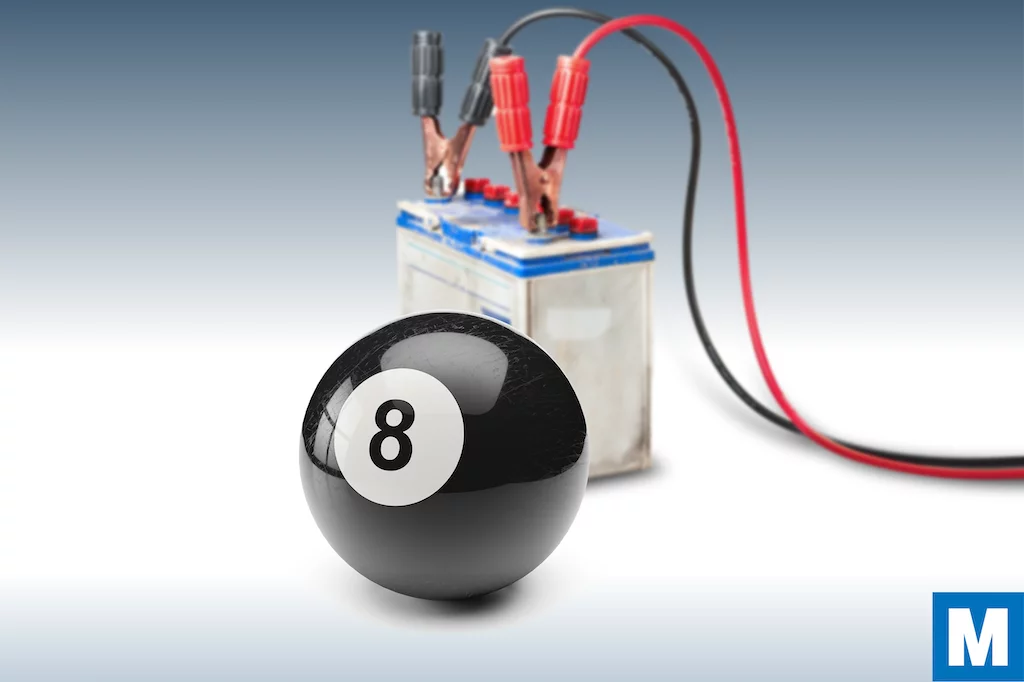More than 280 million vehicles are on the road in the United States, and about 98% of them have a 12-volt electrical system. To service those vehicles, there are only around 17,000 franchised car dealerships and under 130,000 general automotive repair shops. It makes for busy service departments, to be sure.
On average, an automotive 12-volt battery needs to be replaced every three to five years, and there are unquestionably millions of vehicles in the American fleet that wouldn’t pass the testing criteria. Whether at an independent or aftermarket repair shop or a dealership, you’re quite likely to encounter a policy that demands every battery gets tested on every visit, intent on finding and changing bad ones.
However, reasons exist why technicians don’t test a battery, and it often makes sense.
The vehicle is relatively new
When a vehicle’s battery is expected to last for up to five years – sometimes longer – it seems like an exercise in futility to test batteries for new cars. That’s especially true for vehicles under a year old that come in for their first oil change service or a minor warranty concern since it’s nearly always a few years until the battery needs to be changed.
Reinforcing this issue is the practice of testing batteries in new vehicles during the pre-delivery inspection. After a clean bill of health just a few months previous, why would you need to check its condition again?
Unfortunately, most techs can identify instances – however rare – when a battery failed during the PDI check or a brand new car in inventory needed a new battery installed. Even for new cars, bad batteries can happen.
The battery was recently replaced
If the vehicle history in the CRM shows a battery replaced on the previous visit, it’s tempting to skip the battery test. It’s fairly safe to assume that a new battery won’t be weak or fail in a matter of months.
But that’s not always the case. AAA recommends getting a replacement battery from a high-volume retailer because service life doesn’t start when it’s installed, but when the battery is manufactured. A newly-installed battery from old stock could fail sooner than you expect, just like a battery under the hood of a new car.
The car was just in the shop
Imagine a car that was just on the hoist a week ago for diagnosis, had parts ordered, returns for the repair. Since the battery was tested on the original visit, there’s likely no change in the battery’s condition since then. It’s logical to skip the test, save time, and finish the job.
But what isn’t known is how the customer used their car in the past week or the conditions they drove in. Is it possible they forgot the lights on and drained the battery? Complete discharge accelerates a battery’s deterioration, and it could be due for a replacement.
It takes too much time
On some services or repairs, the time it takes to complete a battery test just doesn’t seem worth it. An oil change that pays a technician 0.3 hours or a brake service for a half-hour’s pay doesn’t leave much time to test the battery. Not only does it eat into flat rate profitability, but testing every battery in every vehicle that’s touched could stretch a tech’s day out by 30 minutes or so.
The focus can often be on the wrong area. Keeping the customer satisfied ensures they’ll be back the next time they need service, and showing test results either passing or failing can help solidify their trust in the store and their future loyalty. The time is worth it.
Can’t find the battery tester
A concern among service staff is a rarity among battery testers. It’s all too common to hear, “Do you know who has the Midtronics tester?” multiple times a day. After a minute or two of searching or discovering that there’s a three-person lineup waiting to use the tester, the test is abandoned.
You can hardly fault any tech for a situation like this. When tools for the job aren’t available, a natural reaction is to simply move on unless a warranty code is required. The problem is that it doesn’t nullify the importance of testing every battery, and it’s not in the customer’s best interest to just skip it altogether.
The concern isn’t related to the battery
If a customer comes in for a coolant leak, does the battery really need to be tested? And what about a simple brake light bulb replacement or a trim repair inside the car? When the electrical system isn’t involved in a work order, techs could be inclined to skip a battery test.
Again, the work order’s complaints don’t always paint the full picture. There could be slow cranking concerns or flickering lights that the customer forgot to mention, and test results can illuminate a problem that adds revenue. But more than anything, testing the battery even when the concern doesn’t seem to relate to it instills confidence in the owner that their car is being well looked after every time they come in.
It doesn’t pay anything
Flat-rate technicians only earn an income for jobs they complete, and aside from a warrantable replacement, a battery test doesn’t come with any pay. It’s understandable to focus on efforts that have an obvious, defined reward attached to them, so the battery test is skipped over on the quick multi-point inspection.
Although it usually doesn’t come with financial compensation itself, almost all techs can identify times when a battery test revealed an upsell or exposed an issue that led to more work.
Can’t easily get at the battery
Some batteries can’t be tested as easily as popping the hood and connecting to the battery. Some rather common models have their battery hidden under the floor in the hatch or trunk, and sometimes it could even be under the backseat. Access takes a few extra minutes.
However, it doesn’t negate any of the aforementioned reasons to test a battery. In fact, it might’ve been skipped at a previous service visit, making it even more important to test it this time around.
Not only are battery sales profitable, but it’s something that boosts customer satisfaction. Anyone who’s been frustrated by a dead battery knows the feeling that a vehicle owner could face, and it’s often preventable simply by making it common practice to test every single battery.
Whether it’s for an independent repair shop or a franchised dealership, make sure technicians know the reasons to test every battery on every visit. Even more importantly, outfit the shop with enough Midtronics testing equipment so technicians and support staff can easily find one when needed.




